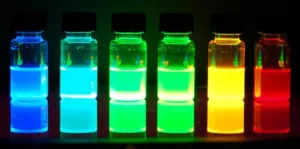The European Commission has decided to ban cadmium from TVs and displays in Europe from October 2019 as part of the RoHS Directive and consequent regulations. Cadmium will also be banned in lighting, although commercial products are not currently commercially available. Cadmium has been used in quantum dots, which are more efficient when they use cadmium.
“This is a much-needed decision, which will provide market certainty as to the end date of cadmium use in TVs and displays, with immediate effect for lighting,” said Dr. Michael Edelman, CEO of Nanoco, which specialises in cadmium-free quantum dots and has campaigned for the ban.
“Cadmium-based technology has been a non-starter from the beginning,” said Dr. Edelman. “This is a failed technology that has been abandoned by leading international display manufacturers and rejected by consumers. Data shows that nearly 519 million Wide Colour Gamut (WCG) displays were sold globally in 2016. Of that number, fewer than 400,000 products (or 0.08% of the market) containing cadmium were sold. Multiple cadmium-free technologies are widely available (including QLED, OLED, Advanced Phosphor, and Enhanced Color Filter) from market leading suppliers such as Samsung, Merck, Dow, and others for the fast growing WCG display market. This competition already ensures that market requirements for high color performance, energy efficiency, and cost are being effectively met. The cadmium-free future is bright and Nanoco is excited to be at the forefront of innovation in this industry.”
Analyst Comment
This is a solid win for Nanoco. One of the opponents of this change was 3M which has said that it will stop making its QDEF film (3M to Retire QDEF) and another was QD Vision, which is out of the QD display business after Samsung bought its ip. I must say that while I could see the arguments for cadmium, Samsung, which has been leading the marketing of QD materials, would not use cadmium-based materials (which is the same position as Apple) and has been selling QD products competitively for some time, so it was hard to see the value of the argument for having an exemption to the RoHS regulations for displays, even though proponents said that the material would not end up in the environment.
Although the regulation ‘only’ applies to Europe, the reality is that in this global market, a requirement for Europe is effectively a global regulation. (BR)

